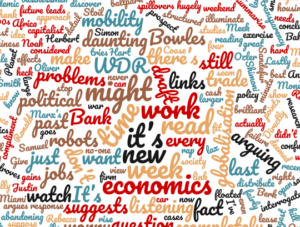Hi all,
So, as predicted, the Great British Summer lasted slightly less time than it would take to learn the words to Got My Mind Set On You, and we’re now back in winter, at least in Oxford. Bah. And the playoffs are still completely draining all of my mental energy. After all, who needs sleep when you can watch LeBron do this instead (and you marvel at the fact that his team is so bad that he still might not go through). Thank god I don’t watch the IPL, or I’d be a zombie.
- Speaking of zombies, no-one seems to be able to kill the idea that the robots are coming to make us all unemployed. The new WDR is on the future of work, and in a fit of transparency the World Bank are uploading a new draft every week (because “I want to read the WDR every week” is apparently a thing that someone at the Bank thinks people are saying). Anyway, Duncan Green takes issue with the draft he read for being too optimistic about robots: he argues that just because they haven’t taken our jobs away in the past doesn’t mean they won’t this time. The problem with this argument is that there’s no evidence that it is different this time. Why would relative prices stop adjusting just because there’s a car without a driver in it? The pace of change may seem daunting, but it seemed pretty damn daunting in the past too: lamplighters must have had visions of the apocalypse when electric lighting was invented, and rightly. Jobs will be destroyed. The question is how fast, and how flexible we are for dealing with it.
- Related: while we worry far too much about sewbots taking jobs, Adrian Wood suggests we probably worried too little about trade doing the same. He’s not arguing that we need to erect the barriers and press the autarky button. Rather, he suggests that the academic arguments about globalisation in the 1990s fostered a false sense of security among policymakers. The ultimate conclusion that it would have a small effect on employment depended on assumptions about the flexibility of the economy and the labour market, including geographic mobility. If we want to do something sensible to prepare for the rise of the machines, it’s on that side. Luckily [heavy sarcasm voice] geographic mobility of workers is a completely uncontroversial topic, and so is housing.
- Staying on the general theme, Trump’s response to failure of the US to distribute the gains from globalisation fairly has been to engage in some trade policy button-mashing. I floated the prospect that it might actually work last week, but don’t worry – Rebecca Shimoni Stoil points out that the tariffs are hugely damaging to farmers, who are abandoning him in droves.
- The last salvo in the cash transfers war, as Berk Özler goes into minute detail (and this is a compliment) on his reading of the Give Directly evaluation, arguing that the large negative spillovers that Justin Sandefur deemed implausible are in the ballpark of previous studies, while the positive effects are not – they are much larger.
- This is brilliant: Samuel Bowles looks at the link between Marx’s view of how society and the firm are structured and those of Ronald Coase, Herbert Simon and Oliver Hart. I’ve read all four and never considered the links before – it’s a fascinating exercise, and leads Bowles to suggest that most economics is the economics of ‘solved political problems’, but the most interesting work is about open political problems. It’s an unconventional phrasing, but does illuminate some aspects of what differentiates some of the best new research.
- Planet Money do some digging into recent cases of grand corruption involving Chinese businessmen in Africa, and their links to State-Owned Enterprises and the massive Belt and Road initiative. It’s hard to summarise, but really worth listening to (transcript), even if I question some of the more reaching interpretations they make.
- Lastly, some glorious randomness: Noah Smith tries to interrogate the economics of rap music lyrics and is stunned to discover it’s capitalist and materialistic. What the heck was he listening to before he discovered that? Did he not know that Miami, DC prefer Versace? And that Meek didn’t, in fact, lease that Rolls Royce? That Rakim was, finally, Paid in Full? Though I suppose he might have been confused by the lax approach to property rights on show.
Have a great weekend, everyone!
R

